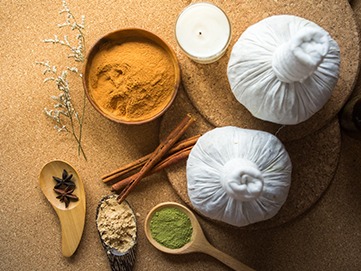Ayurvedic herbs for immune system
In Ayurveda, amla and tulsi are often called ‘immunomodulators’. Immunomodulators modify or modulate the immune system to fight against an illness or a disease. Continue reading to know what else amla and tulsi can do for your body.-
Amla
-
Tulsi
Ayurvedic herbs for weight loss
-
Triphala
-
Ashwagandha
Ayurvedic herbs for hair
-
Bhringraj
-
Brahmi
Ayurvedic herbs for overall health
-
Turmeric
-
Cardamom
Recommended herbal teas for your daily diet
Chamomile, ashwagandha, and cardamom are some of the best herbal teas you can consume daily. Here is why:-
Chamomile tea -
Chamomile is highly beneficial for people with diabetes, as it lowers blood sugar levels. It induces sleep and relaxes your mind. Chamomile treats colds and mild skin infections. You can use the dried chamomile powder from stores or boil five to six flowers. Strain the decoction and add honey for sweetness. It works best at night time. -
Ashwagandha tea
– This tea works like a charm for people with sleeping disorders and anxiety. You can have ashwagandha tea twice a week. Boil its roots and add honey and cardamom for an enhanced flavour profile. -
Cardamom tea –
Cardamom tea is effective in treating mild digestive disorders. It boosts immunity and prevents you from impending heart diseases. It may also have a role in reducing excess body weight. Crush the cardamom pods and bring them to a boil. You can either add milk or just sweeteners to it for your taste.
FAQs
-
Which Ayurvedic herbs can be taken daily?
Several ingredients from your kitchen, like amla, ajwain (carom seeds), turmeric, cardamom, triphala, and jeera (cumin seeds), are some of the herbs which can be used daily. -
Which herb is the king of Ayurveda?
The king of Ayurvedic herbs is ashwagandha, as it has many health benefits. -
Do Ayurvedic herbs have side effects?
Ayurvedic herbs are the safest means of medicine. However, it’s recommended to consult your doctor in case of any existing allergies.

